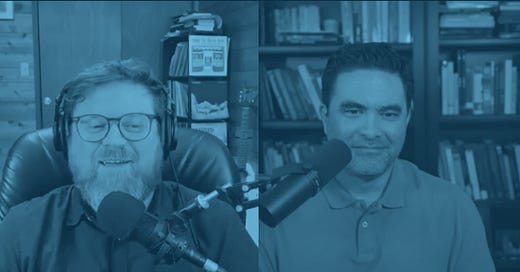Dr. Kirk Honda of the Psychology in Seattle podcast returned this week to chat. (You can hear our previous YHP episode here, or my spiritual abuse interview on Psychology in Seattle here). After talking shop re: our similar work hosting psychology podcasts, we spent a good chunk of time on Dr. Honda's work analyzing film and television through a psychological lens, particularly his popular YouTube videos where he reacts to reality TV shows.
When it comes to reality TV, I’m both intrigued and relatively skeptical. I've heard criticisms about the genre being heavily scripted or manipulated for dramatic effect. Still, Dr. Honda made a compelling case for the value of these shows as tools for psychoeducation and cultural insight. He explained that while some shows indeed have more scripting than others, many — particularly those focused on relationships like "Love is Blind" — feature genuine human interactions and emotions, with high stakes for participants finding their life partners.
Dr. Honda described how he uses these shows as jumping-off points for deeper psychological discussions by watching the edited content and offering hypotheses about what might be happening psychologically (always with the caveat that he's working with limited information). He's not claiming to diagnose individuals based on edited TV footage, but rather, he uses what's shown to illustrate broader psychological concepts, an approach I find ethically and intellectually honest.
We also discussed how these shows can provide unique opportunities to explain complex psychological ideas to a general audience, like how the Johnny Depp-Amber Heard trial gave him an organic opportunity to discuss the Minnesota Multiphasic Personality Inventory (MMPI) to a wide audience who might not otherwise seek out such information — and who’s not in the market for something like that?! This method of "hiding the vegetables in the meal," as we jokingly referred to it, seems like an effective way to broaden psychological literacy among the general public.
While I won’t be binge-watching the Golden Bachelorette this weekend, our conversation certainly opened my eyes to the potential of reality TV as a tool for psychological education and cultural exploration and as a vehicle for a deeper understanding of human behavior and mental health. I plan to incorporate more film and TV in my public work going forward, much of which will likely have to wait until the end of this internship year, which is stretching my schedule to its natural limits. More to come on all that in coming months!
Enjoy this email? Forward to a friend!
As always, you’re invited to join my Patreon to support my work and get access to all full episodes, completely ad-free.




